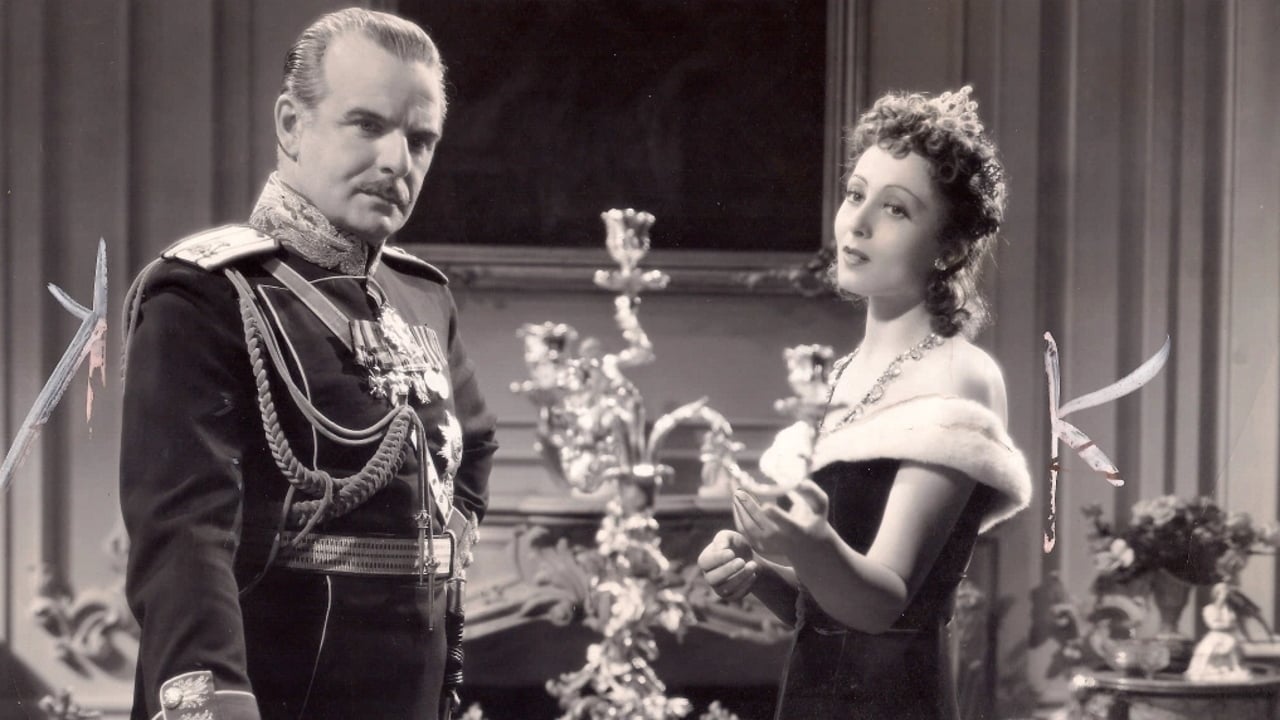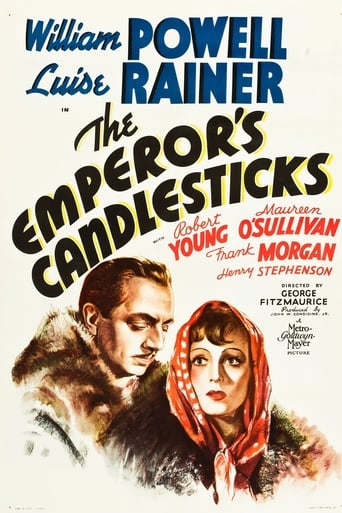

Dressed up as "Romeo" for a masquerade ball in Vienna, Russian royal Robert Young (as Peter) meets pretty costumed "Juliet" Maureen O'Sullivan (as Maria). They seems like a perfect match, but it's really a plot to abduct Mr. Young. His imperial highness is to be exchanged for her revolutionary father. Young has written a letter to his father, asking him to halt the execution of Ms. Sullivan's father. The letter eventually becomes hidden in "The Emperor's Candlesticks". Chasing them around are a couple of spies, Polish secret agent William Powell (as Stephan Wolensky) and Russian counter-agent Luise Rainer (as Olga Mironova). Of course, the spies become mutually attracted...That may or may not be a good description of the plot; it's simple, but confusingly presented. Director George Fitzmaurice and his editor do not assist in making it understandably smooth. In an interesting scene, we cut from Mr. Powell looking at a train station poster to what looks like a clip from the end of "Anna Karenina" (1935). This is perversely appropriate as Ms. Rainer often appears to be doing impersonations of that film's star, Greta Garbo. By the mid-1930s, Garbo's films were making 2-3 times more money than previously; that's great, but she was averaging only one every two years. MGM needed another glamorously accented worldwide star. Enter Luise Rainer..."The Emperor's Candlesticks" was the first film to feature Ms. Rainer as a big star. While second-billed, she clearly commands the camera's focus; this film was produced for her. It's also the first Rainer made after back-to-back "Best Actress" Academy Award-winning performances in "The Great Ziegfeld" (1936) and "The Good Earth" (1937). The star of Rainer's first two US films, Powell appears more puzzled than passionate in his scenes with Rainer; remember, he's supposed to be falling in love with her. More perturbed than puzzled MGM mogul Louis B. Mayer, who orchestrated Rainer's Oscar-saturated introduction, received notice that his Garbo gamble might not pay off.**** The Emperor's Candlesticks (7/2/37) George Fitzmaurice ~ Luise Rainer, William Powell, Robert Young, Maureen O'Sullivan
... View MoreThe handsome Prince (Robert Young) has been kidnapped and will be killed unless a Polish secret agent (William Powell) is able to sneak a ransom note to the Czar. Unfortunately, he chose a rather silly place to hide the note (inside a specially created candlestick) and it is lost. At the same time, a Russian spy (Luise Rainer) is trying to sneak in letters incriminating Powell as a spy--and also hides them inside the matching candlestick--which also is lost. Lots of intrigue follows--as well as some MGM style romance.This film should have been better. After all, it starred the wonderful William Powell and had such supporting stars as Maureen O'Sullivan, Robert Young, Frank Morgan and Henry Stephenson--all fine actors. However, despite a decent script idea and such talent, the film was only okay. Much of this is because the script was rather tepid and talky--with too many scenes listening to the characters play verbal chess--trying to outfox each other. There was little 'zip' or excitement.In addition, some of the blame probably resides with co-star Luise Rainer. While Ms. Rainer only made a small number of Hollywood films, she had the distinction of winning two straight Best Actress Oscars. However, when you see these two performances as well as her subsequent films you wonder why she received such accolades. The performances just didn't age well. In the last week or so I have seen six of her more famous films, I can't help but think that she was a terribly over-rated star. I'm sure she's a nice person and is still thriving today at 98 years-old. But her style of acting usually included staring wide-eyed into space and often reciting her lines in an over-eager fashion--more like a girl in a high school play than someone trying to play a realistic performance. While Ms. Rainer was better in THE EMPEROR'S CANDLESTICKS than in some of her other films (particularly DRAMATIC SCHOOL and BIG CITY), she still was not up to starring against Powell.Now all this is NOT to say that this is a bad film--it's enjoyable enough. But there just isn't much spark or energy and could have been a lot more interesting. A decent time-passer and that's about it.
... View MoreBack in the '30s, the studios made dozens of movies that were set in Europe to give Americans during the Depression a sense of fantasy and other world glamor, and to keep their foreign market. "The Emperor's Candlesticks" starring William Powell and Luise Rainer is such a film, with supporting roles featuring two young stars, Robert Young and Maureen O'Sullivan. Powell and Rainer are opposing foreign agents who each hide their documents in a pair of candlesticks to be brought to Russia as a gift to a noblewoman. The candlesticks were to be delivered by Powell, but Rainer talks the Austrian who has given him the task to let her do it. They are stolen by her maid and her boyfriend, and both Powell and Rainer try to be the first to recover them.Powell and Rainer are delightful in this crazy story. Rainer, with her small face and enormous eyes, is gorgeous, playing the part of a spy with charm. Powell is always good and plays off Rainer very well. Robert Young and Maureen O'Sullivan portray a prince and his kidnapper's accomplice, respectively, who meet at a masquerade ball, he dressed as Romeo and she as Juliet. Their last scene together is very sweet.This movie is odd for one reason. The stars all lived for a very long time, and in fact, Rainer at this writing is still alive at the age of 96. Young lived to 91, O'Sullivan to 87, Powell to 91. Must have been something in the water on the set. Wish it had been present on more films!
... View MoreThe plot of "The Emperor's Candlesticks" is total nonsense in the 1930s Hollywood fantasies about benevolent despots, courteous kidnappers, and gallant spies. The story is only an excuse for a masquerade ball and a dash across Europe in pursuit of two candelabras that do not belong to the Russian czar or the Austro-Hungarian emperor, but are a gift from an Austrian nobleman to a Russian noblewomen. The carriers (the Polish Baron Wolensky and the Russian Countess Mironova, played by the stars, William Powell and Luise Rainer) lose and find and mistakenly switch the pair of candelabras.Powell was unflappable in the midst of many ludicrous plots during the 1930s, often with Myrna Loy as a co-conspirator. Here, he is pitted against a lovely czarist secret agent, played, in a large wardrobe, by the great Luise Rainer. In the two immediately preceding films for which she won back-to-back Oscars ("The Great Ziegfeld" with Powell and "The Good Earth" with Paul Muni) and in her only other readily available film, "The Great Waltz," she suffered mightily. In "Candlesticks" she got a chance to play the kind of glamorous clothes horse role in which Marlene Dietrich specialized, with no occasion for jealousy at all. Dietrich and Greta Garbo both played spies in 1930s movies. Each appeared more sophisticated than Rainer's, but I find Rainer more credible as a spy with regrets about the consequences of her occupation than either Dietrich or Garbo. Rainer was also quite beautiful with high cheekbones and eyebrows as plucked as Dietrich, and received star keylighting from MGM.Back in a gilded cage, Robert Young got a chance to be charming and gallant, impeded by the humorous bumbling minder played by Frank Morgan.
... View More